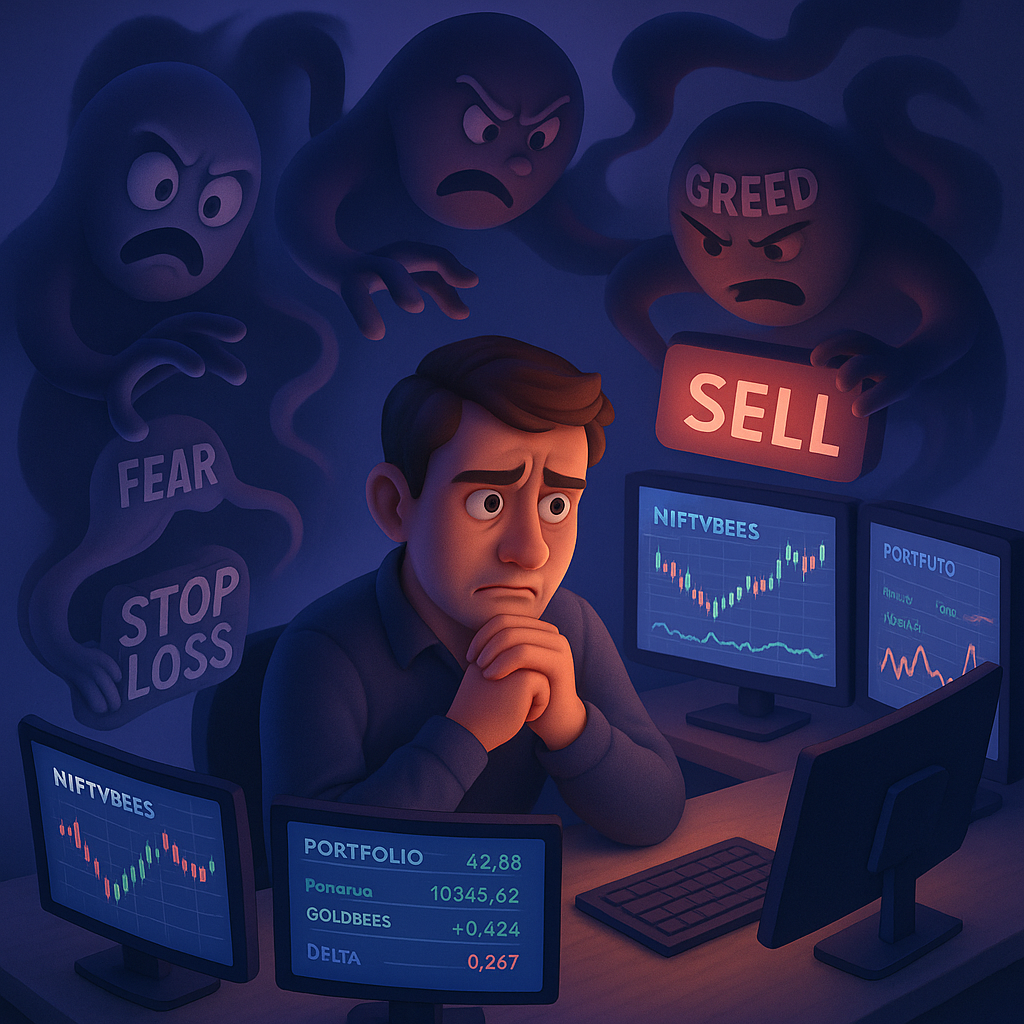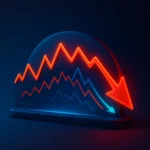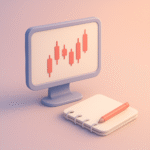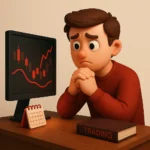7 Trading Mistakes Beginners Should Avoid: A Practical Guide

I still remember the adrenaline rush of placing my first trade. I had just finished reading a few articles and felt invincible. I invested a significant portion of my savings into a stock I barely researched. Within days, the stock plummeted, and I was left staring at a substantial loss.
Table Of Content
- 1. Trading Without a Plan: Setting Sail Without a Compass
- 2. Ignoring Risk Management: Playing with Fire
- 3. Overtrading: The Temptation of Constant Action
- 4. Chasing the Market: The Folly of FOMO
- 5. Neglecting Technical and Fundamental Analysis: Flying Blind
- 🧠 Technical Analysis – The Language of Price
- 📊 Fundamental Analysis – The DNA of a Stock
- 🎯 Why You Need Both
- 6. Letting Emotions Dictate Decisions: The Battle Within
- Holding onto Losing Trades
- Selling Winners Too Early
- Revenge Trading
- 🧭 How to Win the Inner Battle
- 7. Ignoring Continuous Learning: The Market’s Ever-Changing Nature
- Commit to Regular Education
- Review Past Trades Religiously
- Adapt with Agility
- The Bottom Line
- Conclusion: Embracing the Trading Journey with Clarity and Confidence
- ✅ Here’s how you move forward
- Final Thoughts
- FAQs: Trading Mistakes Beginners Should Avoid
- What is the difference between trading and investing?
- How much capital do I need to start trading?
- What are the best markets for beginners?
- How do I choose a reliable trading platform?
- What is a stop-loss order?
- Should I use leverage in trading?
- How important is diversification?
- Can I rely solely on technical analysis?
- How do I manage emotions while trading?
- Is paper trading useful for beginners?
- ⚠️ Disclaimer – Trading Mistakes Beginners Should Avoid
That painful experience opened my eyes to the reality of trading. It’s not about luck or bold hunches—it’s about avoiding common trading mistakes, staying disciplined, and making informed decisions. Over time, I’ve made plenty of errors and learned some tough lessons.
This guide is here to save you that pain by highlighting the critical trading mistakes beginners should avoid, so you can trade smarter and build lasting confidence in the market.

1. Trading Without a Plan: Setting Sail Without a Compass
Imagine boarding a ship with no map, no destination, and no clue what the weather will be like. That’s exactly what it feels like to trade without a plan—you’re adrift in unpredictable markets, hoping luck will guide you to profit.
A trading plan is your personal roadmap. It gives direction, sets boundaries, and brings structure to your decisions. Without it, you’re vulnerable to every market swing, news headline, or emotional impulse.
Here’s what a solid trading plan should cover:
- Financial Goals: Are you aiming for quick, short-term trades or building wealth slowly over time? Your objective will shape your entire approach.
- Risk Tolerance: How much are you truly comfortable losing on a single trade? Knowing this in advance prevents panic when trades go south.
- Entry and Exit Rules: What specific conditions will prompt you to buy or sell? Predefined rules remove guesswork and help you act with confidence.
- Asset Allocation: How will you spread your capital across stocks, crypto, ETFs, or other instruments? Diversification reduces risk and cushions you against isolated losses.
Without a plan, your trades become emotional reactions instead of strategic moves. You start chasing losses, jumping into hype, or exiting too soon out of fear. In the long run, this chaotic approach leads to inconsistency and disappointment.
Trading without a plan isn’t bold—it’s reckless. If you want to succeed, treat trading like a business, not a gamble. Write your plan, stick to it, and refine it as you grow.
2. Ignoring Risk Management: Playing with Fire
Picture this: you’re speeding down a winding mountain road in a sports car—with no seatbelt, no brakes, and no idea what’s around the next curve. That’s what ignoring risk management in trading feels like. It might seem thrilling at first, but it’s only a matter of time before disaster strikes.
Risk management isn’t about eliminating losses—it’s about surviving them. Even the best traders take losses; what separates the pros from the amateurs is how well they manage them.
Here are the core pillars of smart risk management:
- Position Sizing: Never bet the farm on a single trade. A common rule is to risk no more than 1–2% of your total capital per trade. This way, even a string of losses won’t wipe out your account.
- Stop-Loss Orders: These act like a safety net. By setting a stop-loss, you tell the system to automatically sell if the price drops to a certain point—cutting your losses before they snowball.
- Diversification: Don’t put all your eggs in one basket. Spreading your investments across different asset classes (like stocks, ETFs, commodities, or crypto) reduces the impact of any one asset crashing.
Ignoring these principles is like walking into a fire with gasoline in your pockets. You might get lucky a few times, but eventually, the market will humble you—and it won’t be gentle.
The bottom line? Protect your capital like your life depends on it—because in trading, your capital is your lifeline. Manage risk first, profits will follow.
3. Overtrading: The Temptation of Constant Action
TEver felt that itch to do something—anything—just because the markets are open? That’s the trap of overtrading. After a few wins, it’s easy to feel invincible. The rush of making money can become addictive, pushing you to trade more and more… even when there’s no solid reason to.
But here’s the hard truth: more trades don’t mean more profits—they often mean more problems.
Here’s why overtrading quietly eats away at your success:
- Increased Transaction Costs: Every trade comes with a price—commissions, spreads, slippage. These costs may seem small, but over time, they can eat a significant chunk of your gains, especially if you’re trading frequently.
- Emotional Fatigue: Trading isn’t just financial—it’s emotional. Constantly analyzing charts, managing trades, and making split-second decisions leads to mental exhaustion. Fatigue clouds judgment and makes you prone to impulsive mistakes.
- Reduced Focus: The more trades you juggle, the harder it is to monitor each one effectively. You lose the ability to track key levels, follow your plan, or react to changes. As a result, quality suffers.
Think of trading like sniping, not spraying bullets. Precision, patience, and discipline are far more powerful than rapid-fire randomness.
Quality over quantity is your golden rule. Some of the best traders in the world make just a handful of trades a month—but each one is carefully chosen, backed by research, and aligned with their strategy.
Don’t let boredom, greed, or FOMO trick you into treating trading like a video game. Remember, sometimes the smartest move is no move at all.
4. Chasing the Market: The Folly of FOMO
Fear of You see a stock soaring. Everyone’s talking about it. Twitter is buzzing, Reddit is hyped, and your phone won’t stop lighting up with “To the moon!” memes. You panic—not because you’re losing money, but because you’re not in it. So you buy… at the top.
Welcome to FOMO-driven trading.
Fear of Missing Out is one of the most dangerous emotional traps in trading. It convinces you that sitting out is a mistake—and that you must act now or be left behind forever. But chasing the market is like trying to catch a train that’s already left the station. By the time you hop on, it might be heading the other way.
Here’s why FOMO can wreck your trades:
- Buying High, Selling Low: You jump in at peak prices—just when smart money is exiting. Then a correction hits, panic sets in, and you sell at a loss.
- Neglecting Research: FOMO trades are rarely planned. There’s no strategy—just blind reaction to hype, noise, and headlines.
- Higher Risk Exposure: Trending markets can reverse violently. The volatility that makes them exciting can also punish late entries brutally.
The solution? Discipline over impulse. Great traders don’t chase—they prepare. They watch from the sidelines, wait for pullbacks, confirm signals, and enter on their terms, not the crowd’s.
Think of it this way: missing a trade is not a loss—but chasing the wrong one often is.
Stick to your plan. Let others chase shadows while you wait for clarity. In trading, patience isn’t just a virtue—it’s a strategy.
5. Neglecting Technical and Fundamental Analysis: Flying Blind
RImagine trying to fly a plane through stormy skies without instruments—just your instincts to guide you. Sounds reckless, right? That’s exactly what you’re doing when you trade without solid technical or fundamental analysis.
Many beginners fall into the trap of trading based on gut feelings, social media buzz, or tips from friends. But in the world of trading, intuition without insight is just guesswork—and guesswork is a recipe for disaster.
Here’s why proper analysis is your radar in the market:
🧠 Technical Analysis – The Language of Price
This involves studying charts, trends, candlestick patterns, and indicators like RSI, MACD, and moving averages. Technical analysis helps you:
- Spot entry and exit points
- Understand price momentum and support/resistance levels
- Identify potential reversals or breakouts
It’s like reading the market’s body language—seeing what it’s doing, not just what people are saying.
📊 Fundamental Analysis – The DNA of a Stock
Fundamentals tell you what to buy (or avoid). It’s about digging into:
- Financial statements (profit/loss, balance sheet, cash flow)
- Earnings reports and growth projections
- Industry trends, management quality, and macroeconomic conditions
Fundamental analysis helps you assess the true value of a stock and whether it’s worth your money in the first place.
🎯 Why You Need Both
Relying on only one is like trying to solve a puzzle with half the pieces. While technicals show you when to trade, fundamentals help decide what and why.
Smart traders blend both. For example, you might identify a fundamentally strong stock and then use technicals to find the best time to enter.
Bottom line: Don’t fly blind. Equip yourself with tools that help you make informed, strategic decisions—not emotional or impulsive ones. In trading, knowledge isn’t just power—it’s protection.
6. Letting Emotions Dictate Decisions: The Battle Within

The most intense battles in trading aren’t fought on charts—they’re fought within your own mind.
Fear, greed, hope, and frustration can be louder than any indicator or trend line. Left unchecked, these emotions hijack your decisions and turn a well-planned trade into a costly mistake.
Let’s break down the common emotional traps that derail even the most promising strategies:
Holding onto Losing Trades
You bought a stock… it drops. Instead of cutting your losses, you hope it will bounce back. “It has to go up eventually,” you tell yourself. But the loss grows—and hope turns into denial.
This is known as the sunk cost fallacy: you stay in a losing position simply because you’re already in it. The result? Small losses turn into portfolio-wrecking disasters.
Selling Winners Too Early
You’re finally in profit—but instead of following your exit plan, you panic. “What if it drops now?” So you cash out too soon, leaving potential profits on the table.
This is fear in disguise: fear of losing gains, fear of being wrong. Ironically, it stops you from maximizing your wins.
Revenge Trading
You take a loss. Your ego flares up. You feel the need to win it back—fast.
So you force trades, abandon your setup, and take irrational risks. Instead of recovering, you spiral further, compounding your losses.
This is one of the most dangerous emotions in trading—revenge. It replaces logic with desperation.
🧭 How to Win the Inner Battle
- Stick to a written plan. Predefine your entry, exit, and stop-loss levels. Let the plan make decisions—not your mood.
- Use automation when possible. Set stop-loss and take-profit orders so you’re not tempted to second-guess yourself in real time.
- Maintain a trading journal. Tracking your trades (and your emotions) reveals patterns that can help you course-correct.
- Accept that losses are part of the game. Even the best traders lose. What matters is how you lose—and whether you learn from it.
Remember, the goal isn’t to eliminate emotion—it’s to not let it make decisions for you. Master your emotions, and you’ll master your trades.
7. Ignoring Continuous Learning: The Market’s Ever-Changing Nature
The financial markets are anything but static—they shift constantly in response to economic changes, global events, technological innovations, and investor sentiment. If you’re not learning, you’re falling behind.
Trading is not a “set it and forget it” game. What worked last year—or even last month—might not work today. Many beginners make the mistake of thinking they’ve “figured it out” after a few wins. But the truth is, trading is a lifelong learning journey, not a one-time skill set.

Here’s how to stay ahead of the curve:
Commit to Regular Education
Treat your trading knowledge like a portfolio—it needs ongoing investment to grow.
- Attend webinars, workshops, or trading courses to deepen your understanding of new tools and strategies.
- Read reputable books and financial news sources to stay informed about market dynamics, innovations, and regulations.
- Follow seasoned traders and analysts whose insights challenge your thinking—not just confirm your beliefs.
Review Past Trades Religiously
Every trade—win or lose—is a learning opportunity. Ask yourself:
- What went right?
- What went wrong?
- Did I follow my plan or act emotionally?
- How could I have improved my entry, exit, or position size?
This kind of reflection transforms experience into wisdom. Keeping a trading journal makes this process even more powerful.
Adapt with Agility
Markets shift. Volatility spikes. New asset classes emerge. Strategies that once printed money may suddenly stop working. That’s why flexibility is key.
- Don’t marry one strategy—be willing to tweak or abandon it if the market conditions change.
- Stay open-minded and curious. Stagnation is a silent killer in trading.
The Bottom Line
Continuous learning isn’t optional—it’s your edge. The best traders in the world never stop studying. They read, reflect, and adapt. That’s what keeps them sharp, relevant, and profitable.
In a world where the markets evolve every day, your ability to learn and grow faster than others is what will separate you from the crowd.
Conclusion: Embracing the Trading Journey with Clarity and Confidence
Trading isn’t just about charts, numbers, or market news—it’s about growth. It’s a mental, emotional, and strategic journey that tests your discipline, patience, and resilience every single day. The road may be rocky, but the rewards are real for those who learn from their missteps and keep pushing forward.
Throughout this guide, we’ve explored some of the most critical trading mistakes beginners should avoid—from neglecting risk management to letting emotions dictate decisions. These aren’t just abstract ideas; they’re real-world pitfalls that have tripped up countless new traders (myself included).
Avoiding these trading mistakes won’t guarantee overnight success—but it will dramatically improve your odds of surviving and thriving in the markets.
✅ Here’s how you move forward:
- Create and follow a solid trading plan—don’t wing it.
- Respect risk like it’s your trading partner, not your enemy.
- Prioritise quality over quantity—every trade should have a purpose.
- Stay grounded—don’t chase the market or follow hype blindly.
- Commit to technical and fundamental analysis, not intuition alone.
- Master your emotions—they can be your greatest enemy or ally.
- Keep learning, always. The market is your teacher if you stay curious.
Final Thoughts
The most successful traders aren’t the ones who never made mistakes—they’re the ones who learned which trading mistakes beginners should avoid and took action to evolve.
Treat each trade as a lesson. Celebrate progress. Embrace setbacks as growth points. With consistent effort, clear strategy, and the right mindset, you can become the trader you aspire to be.
FAQs: Trading Mistakes Beginners Should Avoid
What is the difference between trading and investing?
Trading involves frequent buying and selling of assets for short-term gains, while investing focuses on long-term growth by holding assets over extended periods.
How much capital do I need to start trading?
You can start with as little as ₹10,000, but it’s essential to trade with money you can afford to lose and to manage risks appropriately.
What are the best markets for beginners?
Stock markets are generally recommended for beginners due to their transparency and regulatory oversight.
How do I choose a reliable trading platform?
Look for platforms with user-friendly interfaces, robust security measures, low fees, and excellent customer support.
What is a stop-loss order?
A stop-loss order automatically sells a security when it reaches a predetermined price, limiting potential losses.
Should I use leverage in trading?
Leverage can amplify gains but also increase risk. Beginners should use leverage cautiously and understand its implications fully.
How important is diversification?
Diversification spreads risk across various assets, reducing the impact of a poor-performing investment on your overall portfolio.
Can I rely solely on technical analysis?
While technical analysis is valuable, combining it with fundamental analysis provides a more comprehensive understanding of market conditions.
How do I manage emotions while trading?
Developing a solid trading plan, setting clear goals, and practising discipline can help manage emotional responses.
Is paper trading useful for beginners?
Yes, paper trading allows you to practice strategies without risking real money, helping you gain experience and confidence.
Found this guide helpful? Feel free to bookmark it, share it with fellow traders, and follow along for more straightforward, experience-based insights. I’m here to share what I’ve learned along the way — no hype, just honest trading lessons.
⚠️ Disclaimer – Trading Mistakes Beginners Should Avoid
This post is meant for educational and entertainment purposes only. I am NOT a SEBI-registered advisor, and nothing written here should be interpreted as investment advice. Always consult a qualified financial professional before making investment or trading decisions. Or at the very least, consult your cat. 🐱






